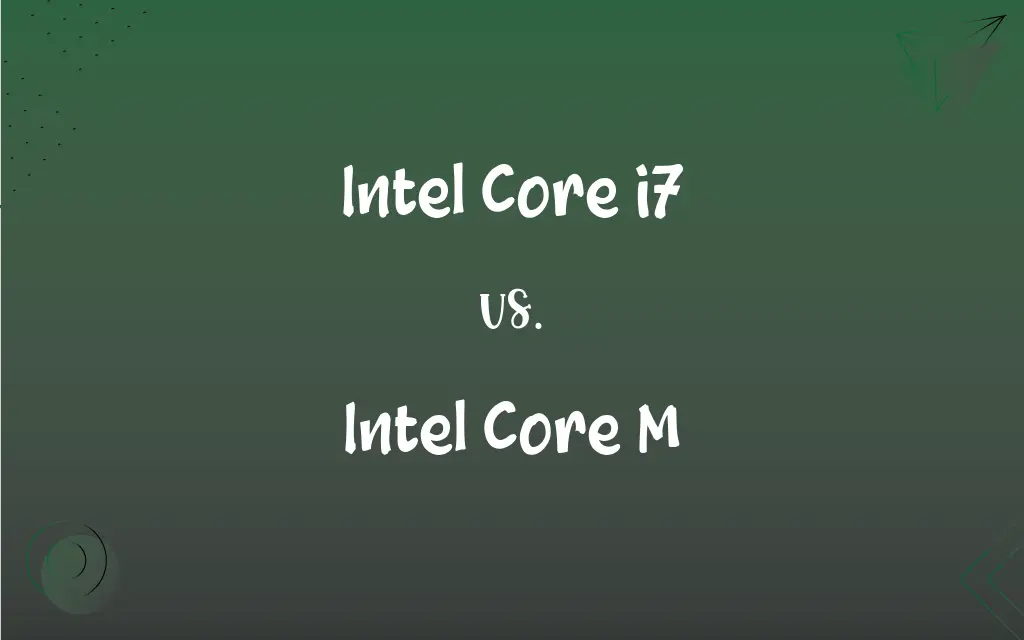Intel Core i7 vs. Intel Core M: What's the Difference?
Edited by Harlon Moss || By Janet White || Published on February 8, 2024
Intel Core i7 is a high-performance CPU line, while Intel Core M focuses on efficiency and power conservation.

Key Differences
Intel Core i7 processors are known for their high performance and are commonly used in powerful desktops and laptops. They support higher clock speeds and more cores. In contrast, Intel Core M processors are designed for ultra-thin, energy-efficient devices, prioritizing battery life and lower heat generation.
The Intel Core i7 series boasts advanced features like hyper-threading and turbo boost, enhancing multitasking and speed. Meanwhile, Intel Core M processors, with their lower power consumption, do not usually offer these features, focusing instead on delivering sufficient performance for everyday computing tasks.
Intel Core i7 processors are ideal for demanding applications like gaming, video editing, and 3D rendering. On the other hand, Intel Core M processors are more suited for basic tasks such as web browsing, document editing, and media consumption.
When it comes to thermal design power (TDP), Intel Core i7 CPUs have a higher TDP, requiring more effective cooling solutions. Intel Core M CPUs, with their low TDP, can operate without a fan, enabling silent and thinner device designs.
In terms of price, Intel Core i7 processors are generally more expensive, reflecting their advanced capabilities. Intel Core M processors are more affordable, making them a cost-effective choice for budget-friendly and portable devices.
ADVERTISEMENT
Comparison Chart
Performance
High performance, suitable for demanding tasks
Efficient performance for basic tasks
Power Consumption
Higher, with more cooling required
Lower, designed for energy efficiency
Ideal Usage
Demanding applications like gaming, video editing
Everyday tasks like web browsing, document editing
Thermal Design Power (TDP)
Higher TDP
Lower TDP, often fanless
Price
Generally more expensive
More affordable
ADVERTISEMENT
Intel Core i7 and Intel Core M Definitions
Intel Core i7
Intel Core i7 is a line of high-end CPUs designed for advanced computing tasks.
The Intel Core i7 processor in my laptop handles video editing smoothly.
Intel Core M
Intel Core M stands for mobile computing with moderate performance needs.
The Intel Core M processor handles my basic media consumption needs well.
Intel Core i7
Intel Core i7 CPUs are synonymous with high processing power and speed.
My workstation's Intel Core i7 effortlessly runs complex 3D modeling software.
Intel Core M
Intel Core M represents Intel's focus on balancing performance and battery life.
The Intel Core M in my tablet ensures long battery life while browsing.
Intel Core i7
Intel Core i7 stands for cutting-edge technology in personal computing.
Upgrading to an Intel Core i7 significantly boosted my computer's speed.
Intel Core M
Intel Core M is a processor line designed for slim, power-efficient devices.
My ultra-thin laptop is powered by an Intel Core M processor.
Intel Core i7
Intel Core i7 represents Intel's premium processor series, known for multitasking and speed.
Gaming PCs often use Intel Core i7 for optimal performance.
Intel Core M
Intel Core M CPUs are tailored for everyday computing with energy efficiency.
The Intel Core M processor is perfect for my daily office tasks.
Intel Core i7
Intel Core i7 is ideal for professional and intensive computing applications.
Graphic designers prefer Intel Core i7 for its fast rendering capabilities.
Intel Core M
Intel Core M is known for enabling fanless, lightweight computer designs.
My fanless notebook uses an Intel Core M for silent operation.
FAQs
Do Intel Core i7 CPUs consume more power?
Yes, they have higher power consumption.
Are Intel Core i7 processors good for gaming?
Yes, they are excellent for gaming.
Are Intel Core M processors suitable for gaming?
No, they are not ideal for intensive gaming.
What is the primary use of Intel Core i7 CPUs?
For high-performance computing tasks.
Do Intel Core M CPUs conserve battery life?
Yes, they are designed for energy efficiency.
What is the primary use of Intel Core M CPUs?
For everyday computing with efficiency.
Can Intel Core M operate without a fan?
Yes, many are designed to be fanless.
Is Intel Core M good for multitasking?
It's adequate but not optimal for heavy multitasking.
Can I upgrade from Intel Core M to i7?
It depends on the device's compatibility.
Which processor is better for a desktop PC?
Intel Core i7, for its higher performance.
Are Intel Core i7 processors expensive?
Generally, they are more expensive.
Do Intel Core i7 CPUs have better graphics performance?
Typically, they offer superior graphics performance.
Can Intel Core i7 handle multitasking effectively?
Yes, they excel in multitasking.
Are Intel Core M processors affordable?
Yes, they are more budget-friendly.
Which processor is better for portable devices?
Intel Core M, due to its energy efficiency.
Which processor has a longer battery life in laptops?
Intel Core M, due to lower power consumption.
Are Intel Core M processors good for video editing?
They can handle basic editing, but not intensive tasks.
Do Intel Core i7 processors require advanced cooling?
Often, due to their higher TDP.
Is an Intel Core i7 suitable for professional work?
Yes, especially for demanding tasks.
Is an Intel Core M suitable for professional work?
It depends on the task complexity.
About Author
Written by
Janet WhiteJanet White has been an esteemed writer and blogger for Difference Wiki. Holding a Master's degree in Science and Medical Journalism from the prestigious Boston University, she has consistently demonstrated her expertise and passion for her field. When she's not immersed in her work, Janet relishes her time exercising, delving into a good book, and cherishing moments with friends and family.
Edited by
Harlon MossHarlon is a seasoned quality moderator and accomplished content writer for Difference Wiki. An alumnus of the prestigious University of California, he earned his degree in Computer Science. Leveraging his academic background, Harlon brings a meticulous and informed perspective to his work, ensuring content accuracy and excellence.
































































